江苏省连云港市灌南县实验中学八年级英语《8B Unit5》建议案
八年级英语8B Unit5教案

八年级英语8B Unit5教案B UwelubjectivesTo understandandad it fluentlyTo introduce studational chaProceduLead-What will you do to helau can?2 Land answWhich charity does Hobo walp? (Oxfam)Readagain and answer the qu) What does Oxfam need?2) What does Eddie want Eddie to do?3) Ww restaurant?Try to understand the following) You havleft. (have…left 有…留下、剩下) 2) I am not used to going out before lunch. (be used/doing sth.习惯于…)3) Hobo, you used to be very kind(used to do sth. 过去常常…)4) I’m so weak that I can’t walk any further. (… so…that…如此…以至于)Introduationalcharities andanswers to Part A on PagWhich chaan help them?1) Proble: _____________________aurants sell dishes made in rare animals which ad by law2) Proble: _____________________ldareas in Africa don’t have enough food to eaugh houses to blter. They are ill,buan’t gal. They are old enough, buan’t gl) Proble:______________Caas been blindwas sixteen years old. Now ten years has passedll can’t see anything becauvand hauggalDo Part B on pagWairs and ask and answer l: A: What do youlud most? Why?B: Id … most. Because…Homew) Readluently and remember useful2) Try to sag abouau know.(8B) Unit 5 Reading (1)Objectiv To understand open quused in an interview Tgeneral meaningle and context To predaningwordxt Tunderstanding by linking pa To summaation by completingProceduTalk abouational charities accordinglog2assage and answerWa plalogo? (a flyingal)What do ORBIS workers do every day?(operate on paaatients)aview and answllowing‘true or false’ qu)About 450 millle have heart probl2)Allases of blindness can not be cured or prevented.3)ORBIS doctors do operala)All doctors and nurses glane to learn aboua)Dr Ma sausedard w)People can help by sending donaRBIareful reading1) Read Lines 1-7, answllowing qua. How many people does blindness affect around the world ? Where aly from?b. How male can be cured or prevented?Why don’le receive medical treatment?2) Read Lines 8-25, answllowing qua. Why do ORBIS dwork on a plane?b. How many operations did Dr Maduring his last visit?Is it hard w?d. Is the plane only a plaations?3) Read Lines 26-38, answllowing qua. How do people feel abouwork?b. What does ORBIS need to carry on wwork?What can we d?answers to Part B1 on Page 80Lding and praading aloudPart B2 on Page 80AnaluctuassagHomew) Read the text carefully.2) Praading the new words and useful ex) Finish and discuxbook.(8B) Unit 5 Reading (2)ObjectivTo get a thorough understandingviewTo retell the text with your own words To master useful ex-mailProceduAsk and answer quabout an interview with a ORBIS d2 Complllowing passage.Amy told Danielg about ORBIS toadRBIS is a c 1 that wb 2 people. Blindness a 3 about 45 millle around the world, mostluL 4 , 80ases can bHowever, maatients aaan’t aavelal, and there are still many who do not havaRBIS uses a flyingvulane volunteer d0 operations. Dr Ma, a doctor workingla0 patients during his last vThe plane is also used as a teachingL 12 doctors and nurses calane to learn new s 13 and shaThey can also wavideo. Aare trainedan helle. ORBIS need enougwwork. We caby sending donaRBIarity 2. blind 3. aLuckily 5. curedvented 7. afford 8. medicalal 10ated 12. Localllwledge 15. waauxplalanguag(斜体部分为正确答案,见课件。
《8B Unit5 Main Task》教学案.doc

学生活动
设计意图
Step1.Leading-in
The teacher’s self-introduction:I used to be a student in Nanjing Normal University. Now,Iam a teacher in Zhenjiang Foreign school.
1.Presenting Mary’s story
2.Stick the nine pictures into paragraghs correctly
3.Presentingsome useful expressions and do some exercises.
4.Group discussion:
2、课题的意义:
本课是英语写作课,旨在让学生通过对一组图片(慈善机构如何帮助一位名叫Mary的女孩)的描述,学会运用正确的句型结构和时态;同时在教学过程中:
1.运用任务型教学模式,设计多种类,多层次的教学活动,让学生在活动的完成过程中,感受成功,激发学习英语的兴趣,提高综合语言运用能力。
2.突出学生在课堂中的主体地位,学生在教师的引领下,自主发现问题,讨论问题,解决问题,并对同伴的作文进行评价,老师在此过程中进行适当调控,并对最终作文的评价方式方法给予适当指导。
1. ORBIS: do T/F: ORBIS treats blind people from poor areas for free.
ORBIS doctors do operations in the local hospitals.
2. World Vision: fill in the blanks: World Vision helps a lot of people especially _______.
8B Unit5 全套教案
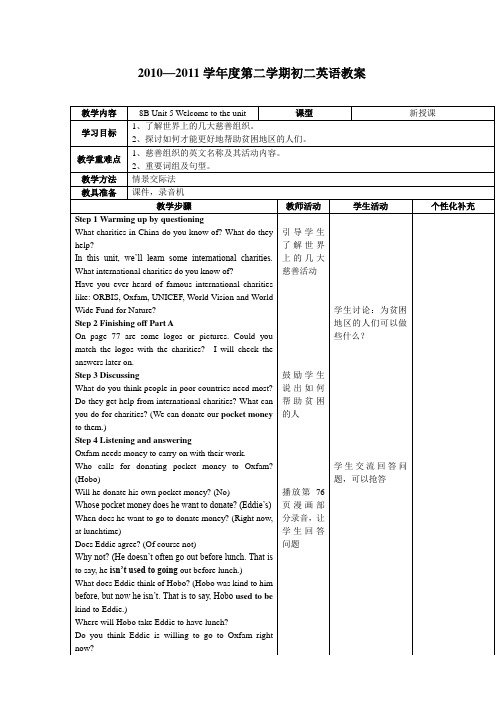
Step 2 Finishing off Part A
教学方法
情景交际法、任务型教学法
教具准备
课件,录音机
教学步骤
教师活动
学生活动
个性化补充
Step 1 Presentation
What international charities do you know about?
What do they do?
Have you heard of ORBIS?
ORBIS helpsblindpeople in poor countries. The state of being blind is calledblindness. Why does ORBIS help the blindpatients? Because blindnessaffectsmany people around the world, mostly in poor countries. But most of thecasesof blindness can be prevented orcured. Why don’t the blind go to see doctors? Because they are so poor that they can’t pay formedical treatment. ORBIS doctors treat them for free. Theyoperate on/do (perform) operations on their patients. So the patients are thankful /grateful to them. How do you think ORBIS doctors feel when they help people? (They feelproud.)
八年级英语8B?Unit5教案

八年级英语8B Unit5教案8b unit 5 comic strip &welcome to the unitobjectivesλ to understand the comic strip and try to read it fluentlyλ to introduce students some international charitiesproceduresstep 1 lead-inwhat will you do to help the poor or charities if you can?step 2 listen to the comic strip and answerwhich charity does hobo want to help? (oxfam)step 3 read the comic strip again and answer the questions1) what does oxfam need?2) what does eddie want eddie to do?3) where is the new restaurant?step 4 try to understand the following sentences1) you have some pocket money left. (have…left 有…留下、剩下)2) i am not used to going out before lunch. (be used to sth./doing sth.习惯于…)3) hobo, you used to be very kind to me. (used to do sth. 过去常常…)4) i’m so weak that i can’t walk any further. (… so…that…如此…以至于)step 5 introduce some international charities and check the answers to part a on page 77step 6 which charities can help them?1) problem 1: _____________________some restaurants sell dishes made in rare animals which are protected by laws.2) problem 2: _____________________children in poor areas in africa don’t have enough food to eat or enough houses to be their shelter. they are ill, but they can’t go to hospital. they are old enough, but they can’t go to school.3) problem 3:______________catherine has been blind since she was sixteen years old. now ten years has passed, she still can’t see anything because she is very poor and has no enough money to go to hospital.step 7 do part b on page 77.step 8 work in pairs and ask and answer like this:a: what do you think people in poor countries need most? why?b: i think they need … most. because…step 9 homework1) read the comic strip fluently and remember useful sentences.2) try to say something about the charities you know.(8b) unit 5 reading (1)objectivesλ to understand open questions used in an interviewλ to infer general meaning from title and contextλ to predict the meanings of specific words from context。
8B Unit5 Good manners教案
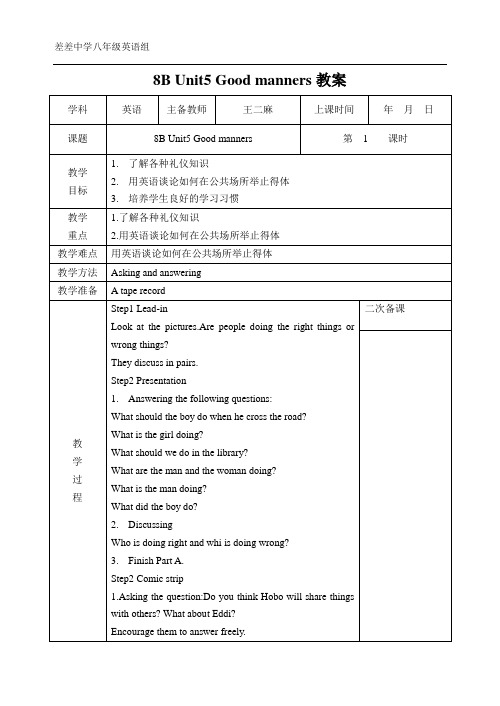
课题
8B Unit5 Good manners
第4课时
教学
目标
1、通过听录音,了解不同公共标志的功能。
2、用从听力中获取的信息,完成一篇报告。
3、学会用英语劝导别人不要做某事。
教学
重点
1、通过听录音,了解不同公共标志的功能。
2、用从听力中获取的信息,完成一篇报告。
3、学会用英语劝导别人不要做某事。
This unit has mentioned some bad manners in public places.
What are they?
What should we do in these places?
Help them to review the points.
2.The teacher says: If some people don’t know how to behave properly in public, we have something to help them. What are they?
Listen to the first part of their conversation and help Shir;ley complete her notes in PartA1.
Play the tape.
Step3.Activities
Show some pictures and then ask and answer.
Read after the tape and finish PartB3.
Encourage them to read in class and then try to act them out.
Step3.Activities
牛津译林版英语8Bunit5Task教学设计

在本章节的教学中,学生将培养以下情感态度与价值观:
1.培养学生对世界各国传统文化的兴趣和尊重,提高跨文化交际能力。
2.培养学生积极参与课堂活动,主动与同学交流合作的意识。
3.培养学生热爱祖国,弘扬中华民族优秀传统文化,增强民族自豪感。
4.培养学生具有全球意识,关注世界和平与发展,树立正确的人生观和价值观。
5.视听作业:
观看一部与节日相关的英文电影或纪录片,例如《舌尖上的中国》英文版中的春节特辑,关注其中与节日相关的英语表达,并尝试模仿影片中的发音和语调。
2.能够运用一般现在时和一般过去时描述节日的活动及习俗,提高英语语法运用能力。
3.能够通过阅读和理解相关文本,获取关键信息,提高阅读理解能力。
4.能够运用所学知识编写一段关于传统节日的对话或短文,提高写作能力。
5.能够通过小组合作,进行信息交流和分享,提高口语表达能力。
(二)过程与方法
在本章节的教学过程中,学生将采用以下方法学习:
(5)注重写作过程的指导,从选词、造句到篇章结构,逐一突破写作难点。
2.教学过程设想:
(1)导入:利用图片、视频等多媒体资源,引导学生谈论自己了解的传统节日,激发学习兴趣。
(2)新知呈现:通过文本阅读,让学生了解世界各地的传统节日及习俗,学习本节课的重点词汇和句型。
(3)实践练习:设计不同类型的练习题,让学生在完成练习的过程中,巩固所学知识。
c.教师总结:Today, we have learned about different traditional festivals and customs around the world. We should respect and appreciate the cultural diversity. In the process, we have improved our English language skills.(今天,我们了解了世界各地的传统节日和习俗,我们应该尊重并欣赏文化的多样性。在这个过程中,我们提高了英语语言能力。)
初中英语8b unit5 教案 international charities

牛津初中英语8B Unit 5 International charities一、教材分析根据新课标,突出学生自主学习的主体地位原则,培养学生自主、合作、探究精神、突出语言运用能力培养的理念而设计。
《英语课程标准》是以学生“能做某事”的描述方式来设定各级目标要求的。
这就决定了我们在教学中要尽量采用“任务型”的教学途径。
在这一教学环节中,教师的任务就是根据单元和课堂教学内容和目标,给学生设计一个阶段、一个单元和每一课的学习任务、目标,并锁定任务,吸引和组织他们积极参与,通过思考、调查、讨论、交流和合作等方式,学习和使用英语,完成学习任务。
本课内容为牛津初中英语8B第五单元的阅读课,讲的是采访ORBIS的医生。
必须把握两点:一,学生并不熟悉这类课文形式;二,学生也不熟悉本文涉及的慈善机构,学生并不清楚其背景。
慈善机构在当今人们的生活中,尤其是贫困地区人们的生活中起到了越来越重要的作用。
这些机构通过不同的方式帮助世界各地的人们。
本单元就是让学生重点了解UNICEF(联合国儿童基金会)、World Vision(世界宣明会)、ORBIS(奥比斯)、Oxfam(乐施会)、Wide fund for Nature(世界自然基金会)五个国际慈善机构。
激发学生乐于助人的情怀,激励他们好好学习,为贫困地区的人们贡献自己的一份力量。
二、学生分析学生处在价值观与人生观形成的重要时期,在学生掌握一定词汇量与阅读技能的基础上,应注意培养学生乐于助人的精神,激发他们好好学习。
三、教学目标知识目标1、掌握本课中斜体部分单词并识别其他生词:affect, mostly, case, cure, medical,treatment, operation, patient, afford, skill, train, operate, indeed, proud, medicine, treat, improve, carry on, interviewer, blindness, volunteer2、理解对话内容,能够说出ORBIS的作用。
牛津译林版英语 8B八年级下册 Unit5 教案

Designing aims
Step1:Leading-in
Good manners are very important in our daily lives.
1.Do you have good manners?
2.What do you always do if you want to show good manners to others?
4. Act it out.
听前的设问和表格有利于学生快速的获取信息,加强理解。对话的操练让学生熟悉目标语言知识为下面的语言运用做准备。创设不同的情景,为学生提供真实的语境,让学生在实践中获得学习的快乐和成就感,同时为拓展环节的语言输出做好语言铺垫。
Step5:Group Work: A competition.
We should/shouldn't...”
通过本环节的复习和巩固,一方面可以唤起学生对之前已经学习过的内容的复习,另一方面提高学生的语言表达能力。
Step2:Presentation
1.Free talk
(1) What traditionalmanners do you know in China?
(2) Toidentify specific details by answering some questions.
(3)To develop the students’ ability of guessing new words’ meanings from the context.
3.Value objectives:
Step3:Presentation
1.Present the six pictures and ask the students to talk about who is doing right and who is doing wrong? Why?
八年级英语8B Unit5教案

八年级英语8B Unit5教案8BUnit5comicstrip&welcometotheunitobjectivesTounderstandthecomicstripandtrytoreaditfluently TointroducestudentssomeinternationalcharitiesProceduresStep1Lead-inwhatwillyoudotohelpthepoororcharitiesifyoucan?Step2ListentothecomicstripandanswerwhichcharitydoesHobowanttohelp?Step3Readthecomicstripagainandanswerthequestions )whatdoesoxfamneed?2)whatdoesEddiewantEddietodo?3)whereisthenewrestaurant?Step4Trytounderstandthefollowingsentences)youhavesomepocketmoneyleft.2)Iamnotusedtogoingoutbeforelunch.3)Hobo,youusedtobeverykindtome.4)I’msoweakthatIcan’twalkanyfurther.Step5Introducesomeinternationalcharitiesandcheckthe answerstoPartAonPage77Step6whichcharitiescanhelpthem?)Problem1:_____________________Somerestaurantsselldishesmadeinrareanimalswhicharep rotectedbylaws.2)Problem2:_____________________childreninpoorareasinAfricadon’thaveenoughfoodtoeatorenoughhousestobetheirshelter. Theyareill,buttheycan’tgotohospital.Theyareoldenough,buttheycan’tgotoschool.3)Problem3:______________catherinehasbeenblindsinceshewassixteenyearsold.Now tenyearshaspassed,shestillcan’tseeanythingbecausesheisverypoorandhasnoenoughmoney togotohospital.Step7DoPartBonpage77.Step8workinpairsandaskandanswerlikethis:A:whatdoyouthinkpeopleinpoorcountriesneedmost?why?B:Ithinktheyneed…most.Because…Step9Homework)Readthecomicstripfluentlyandrememberusefulsent ences.2)Trytosaysomethingaboutthecharitiesyouknow.Unit5ReadingobjectivesTounderstandopenquestionsusedinaninterviewToinfergeneralmeaningfromtitleandcontextTopredictthemeaningsofspecificwordsfromcontext TocheckunderstandingbylinkingpartsofsentencesTosummarizeinformationbycompletingnotesProceduresStep1Talkabouttheinternationalcharitiesaccordingtot heirlogos.Step2Skimthepassageandanswerwhyisthereaplaneinthelogo?whatdooRBISworkersdoeveryday?Step3Scantheinterviewandanswerthefollowing ‘trueorfalse’questions.)About450millionpeoplehaveheartproblems.2)Allofthecasesofblindnesscannotbecuredorprevented.3)oRBISdoctorsdooperationsontheplane.4)Alldoctorsandnursesgototheplanetolearnabouteyeopera tions.5)Drmasaysheisusedtothehardwork.6)PeoplecanhelpbysendingdonationstooRBIS.Step4carefulreading)ReadLines1-7,answerthefollowingquestions.a.Howmanypeopledoesblindnessaffectaroundtheworld?wh erearetheymostlyfrom?b.Howmanysickpeoplecanbecuredorprevented?c.whydon’tsomepeoplereceivemedicaltreatment?2)ReadLines8-25,answerthefollowingquestions.a.whydooRBISdoctorsprefertoworkonaplane?b.HowmanyoperationsdidDrmaperformduringhislastvisit?c.Isithardworkforhim?d.Istheplaneonlyaplacetoperformoperations?3)ReadLines26-38,answerthefollowingquestions.a.Howdopeoplefeelabouttheirwork?b.whatdoesoRBISneedtocarryonwiththeirwork?c.whatcanwedoforthem?Step5checktheanswerstoPartB1onPage80.Step6.Listentotherecordingandpractisereadingaloud.Step7.checkPartB2onPage80.Step8.Analyzethestructureofthepassage.Step9Homework)Readthetextcarefully.2)Practicereadingthenewwordsandusefulexpressions.3)Finishanddiscusstheotherexercisesinthebook.Unit5ReadingobjectivesTogetathoroughunderstandingoftheinterviewToretellthetextwithyourownwordsTomasterusefulexpressionsinthee-mailProceduresStep1AskandanswerquestionsaboutaninterviewwithaoRBI SdoctorStep2completethefollowingpassage.AmytoldDanielsomethingaboutoRBIStoady.oRBISisacthatworksforb2people.Blindnessa3about45millionpeoplearoundtheworld,mostlyinpoorcoun tries.L4,80percentofthesecasescanbec5orp6.However,manyofthepatientsaresopoorthattheycan’ta7totraveltohospital,andtherearestillmanywhodonothave themoneyform8treatment.oRBISusesaflyingeyeh9tovisitpoorcountries.ontheplanevolunteerdoctorspoperations.Drma,adoctorworkingontheplane,onceo 1on150patientsduringhislastvisit.Theplaneisalsousedasateachingcentre.L2doctorsandnursescancometotheplanetolearnnews3andsharetheirk4.Theycanalsow5operationsonvideo.Aftertheyaretrained,theycanhelpmo repeople.oRBISneedenoughmoneytoc6onwithitswork.wecans7itbysendingdonationstooRBIS..charity2.blind3.affects4.Luckily5.cured6.prevented7.afford8.medical9.hospital0.perform1.operated2.Local3.skills4.knowledge5.watch6.carry7.supportStep3Explainsomelanguagepoints..失明影响着全球大约4,500万人,大都是在贫困国家,并且这些病例中约有80%是可以预防或防止的。
牛津译林版八年级下册导学案:8BUnit5(57课时)教学案

8B Unit 5 Good manners 第五课时Integrated skills (新授课)_________ 班级:_________ 姓名:_________【学习目标】1.通过听录音,了解不同公共标志的功能。
2.用从听力中获取的信息,完成一篇报告。
3.学会用英语劝导别人不要做某事。
【学习过程】一、课前预习预习P72-73,翻译下列短语:1.公共指示__________________________2. 警告某人做某事________________________3.保护我们免遭危险_________________________________________________________4.颜色鲜艳__________________________5.在公共场所__________________________6. 帮助解释事情______________________7.帮助我们找到路_____________________8. 告诉我们关于我们周围的地方_______________________________________________9.在像医院、博物馆之类的地方________________________________________________10.禁止乱丢杂物______________________11.注意那个标志_______________________12.禁止停车__________________________13.我们多数人__________________________14. 拍…照片___________________ _二、课堂学习研讨知识点讲解:1. explain vt. &vi.explain 作动词用,意为“解释;说明”,explain…to…向某人解释…The teacher is clever enough to e_________the most difficult question in the easiest way.2. warm vt.&vi 警告;告诫warm sb. (not) to do sth 警告某人不要做某事warm sb. of /about sth.. 提醒、警告某人注意某事。
牛津译林版八年级英语下册8BUnit5 Good manners 教案(表格式)
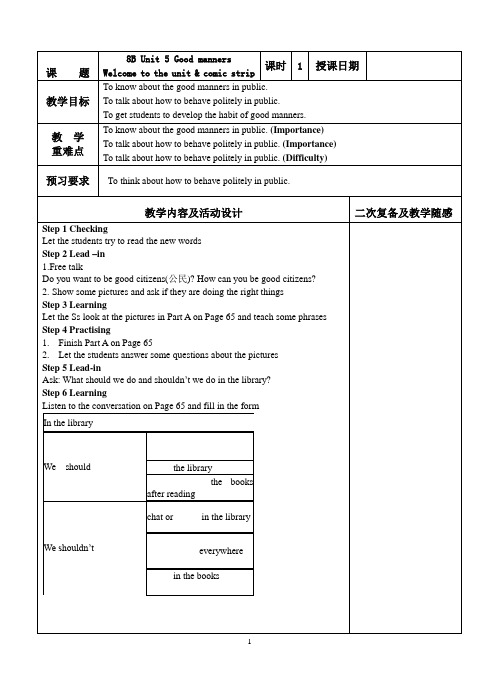
课题8B Unit 5 Good mannersWelcome to the unit & comic strip课时 1 授课日期教学目标To know about the good manners in public.To talk about how to behave politely in public.To get students to develop the habit of good manners.教学重难点To know about the good manners in public. (Importance) To talk about how to behave politely in public. (Importance) To talk about how to behave politely in public. (Difficulty)预习要求To think about how to behave politely in public.教学内容及活动设计二次复备及教学随感Step 1 CheckingLet the students try to read the new wordsStep 2 Lead –in1.Free talkDo you want to be good citizens(公民)? How can you be good citizens?2. Show some pictures and ask if they are doing the right thingsStep 3 LearningLet the Ss look at the pictures in Part A on Page 65 and teach some phrasesStep 4 Practising1.Finish Part A on Page 652.Let the students answer some questions about the picturesStep 5 Lead-inAsk: What should we do and shouldn’t we do in the library?Step 6 LearningListen to the conversation on Page 65 and fill in the formIn the libraryWe should ______ ___________ the library ______ _____ _____ the books after readingWe shouldn’t chat or _____ in the library _____ _____ everywhere _____ in the booksStep 7 PracticeDiscussion:What should we do in a public place? We should….What shouldn’t we do in a public place?We shouldn’t….Step 8 Lead-inAsk: Do you think Hobo will share his things with others? What about Eddie? Step 9 Learning1.Read and answer the following questions.(1). Do you think Eddie really wants to teach Hobo?(2). What does Eddie teach Hobo?(3). What does Eddie really want from Hobo?nguage pointsStep 10 PracticeRead the conversation aloudStep 11 TestingTranslate some phrasesStep 12 Homework1.记忆词汇、词组和句型。
八年级英语下册 8B Unit5 Good manners教案

Step 3 Watch and answer the questions.
1. Do you think Eddie really wants to teach Hobo?
No.
2. What does Eddie teach Hobo?
You shouldn’t leave the tap running.
I’m afraid not.
Look at thepictureson page 65and tell us what we should and shouldn’t do in these public places.
Step 2 New words
6.Yes, they are.
7.We should keep our voice down in public.
Find the detailed information and finish the table.
Good manners in the UK
How to greet people
7. What else should we pay attention to in public?
Keys:1.British people say “hello” or “nice to meet you” and shake the other person’s hand when they meet for the first time.
1. Look at the pictures on page 65 and answer the questions.
1)What should the boy do when he crosses the road?
8B Unit 5教学设计4

新庄中心学校
课题
Grammar
主备人
杨成巧
执教者
杨成巧
课型
new
课时
4
授课时间
教学目标
1. To learn to usequestion words + to-infinitives
2. To learn to usemustandhave to
教学
要点
11.当我们的船撞到岩石损坏之后,我奋力前游。
12.当我最终感到大地在我脚下的时候,我筋疲力尽了。
13.我的胳膊、腿和头发被拴在了地面上。
14.他只有我的小手指那么大。
15.这噪音使他们都摔倒了。
16.他们继续在我的身上走来走去。
17.我也不知道说什么。
二、合作交流
Step 2New words
1. Let someThe students asked their teacher when to hand in their work.
Millie showed us what to do next.
Daniel taught himself how to use a computer to draw.
Don’t forget to tell your mum where to meet you.
e.g. I don’t know what to do.
= I do not know what I should do.
我不知道该做什么。
6. Doing exercises.
1. Complete the dialogue on Page 55.
Amy and Daniel are talking about their Reading Week. Complete their conversation. Use the correct question words andto-infinitives.
江苏省连云港市灌南县实验中学八年级英语下册 Unit5《International charities》建议案 人教新目标版
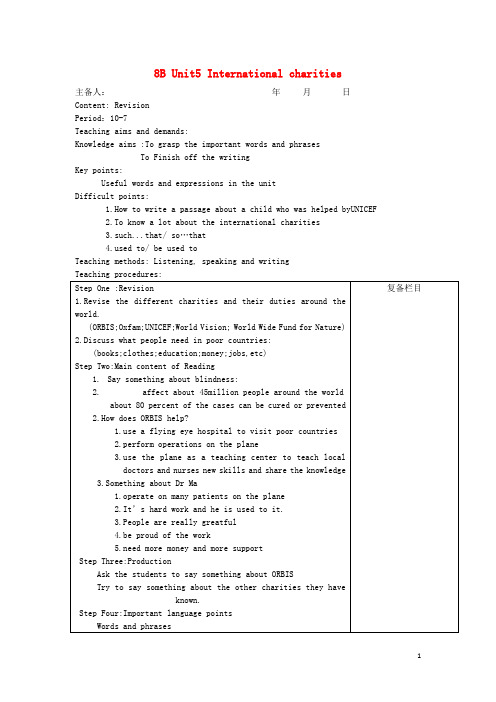
8B Unit5 International charities主备人:年月日Content: RevisionPeriod:10-7Teaching aims and demands:Knowledge aims :To grasp the important words and phrasesTo Finish off the writingKey points:Useful words and expressions in the unitDifficult points:1.How to write a passage about a child who was helped byUNICEF2.To know a lot about the international charities3.such...that/ so…thated to/ be used toTeaching methods: Listening, speaking and writing达标检测(unit5)一、单项选择1.He can ________ in the hospital.A.curedB. be curedC. cureD.curing2.People will support our work by ________ donations to ORBIS.A.sendB.sendingC.being sentD.sent3.They are ______ poor _________they can’t go to see a doctor.A.too;toB.either;orC.so;thatD.such;that4.I am proud ________ I can do something for the poor.A. ofB.thatC.onD.it5.Lucy said she hadn’t heard ___________ music before.A.such beautifulB.a beautifulC.so beautifulD.quite beautiful6.UNICEF is an _________ that works for children.A.newpaperB.schoolC. shopping mallanization7.The children should also __________ kindness.A.treat withB.treated withC. be treated withD.be treat with8.She left in __________ a hurry _________ she forget to lock the door.A.so;andB.such; thatC. too;toD. such; and二、用词的适当形式填空1.We made a __________(decide) at the meeting last night.2.People are used to ___________(eat) hot food in winter.3.Sorry, I __________(leave) my homework at home.4.The Red Cross _________(start) in 1863.5.He performs over 200 ________(operate) on blind people.6.My brother studies in a _________(medicine) school for five years.7.They have good ___________(educate) in that college.8.The rise in the price of goods __________(affect) us all.三、句型转换1.He got up so late that he couldn’t catch the early bus.(同义句)_______________________________________________________________.2.It takesORBIS a long time to fly from one country to another.( 同义句)_______________________________________________________________.3.WWF thinks protecting wildlife is very important.( 同义句)_______________________________________________________________.4.The Green family used to watch TV in the evening.(提问)________________________________________________________________?5.70%的学生对流行音乐感兴趣._______________________________________________________________.四、书面表达请你根据所掌握的有关ORBIS信息,写一篇介绍ORBIS的短文._______________________________________________________________________ ________________________________________________________________________。
【牛津译林版】2011江苏地区英语八年级下册全套备课8BUnit5学案

牛津英语8B Unit 5单元教学要求四会词组:80 per cent of the cases of blindness, medical treatment, perform operations, use the plane as a teaching centre, watch the operations on video,pocket money, be used to , used to , health care , too…to , next to , World Vision , World Wide Fund for Nature, hope to help more people, be grateful to sb., carry on with, perform an operation, an advertisement for…leave sth. at one’s place, get out of the shower, in the shower, tell sb. not to do sth. used to, be used to, work in a hospital/be in hospital, operate on, be/work far away from , at first, spend time/money on sth, the lifestyle of a flying doctor, make the world a better place for the children, do sth. by doing sth. do some voluntary work, organize fund-raising activities, all over the world, set up, get money from donations, save some money, donate money to…, in many parts of the world, help sb. with sth., teach them about doing sth., be afraid of (doing) sth., see a TV programme about sth., train as a nurse, care about sb., do an important job, be grateful to sb., get good grades on one’s presentations, do a lot of good work重点句型:1.I used to spend all my money on CDs.2.Mr Wu says we all got good grades on our presentations.3.We are used to going to restaurants every weekend.4.She is used to working on a plan and is not afraid of flying any more.5.I hope to have a job like Mary’s when I finish school.6.What do you think about UNICEF?7.I used to spend all my pocket money on clothes and snacks.8.Protecting wildlife is important too.9.My mother also told me that pollution is a very serious problem in many parts of the world10.They should go to school instead of working to support their families.11.All children should have clean water and food so that they can be healthy.12.UNICEF helps governments and families make the world a better place for children.13.I’m too weak to walk .14.You used to be kind to me .15.I’m not used to going out before lunch .16.ORBIS uses the plane as a teaching centre17.By training local doctors and nurses, we hope to help more people.18.During my last visit, I operated on 150 patients on the plane. It’s hard work but I’m used to it now.19.People must be grateful to you.20.UNICEF wants to make the world a better place for children.21.Don’t tell him I’m in the shower.22.I’ll look at it when I get out of the shower.23. I left a book at your place yesterday.学优∷中(考],网。
八年级英语下学期unit 5 教案.doc
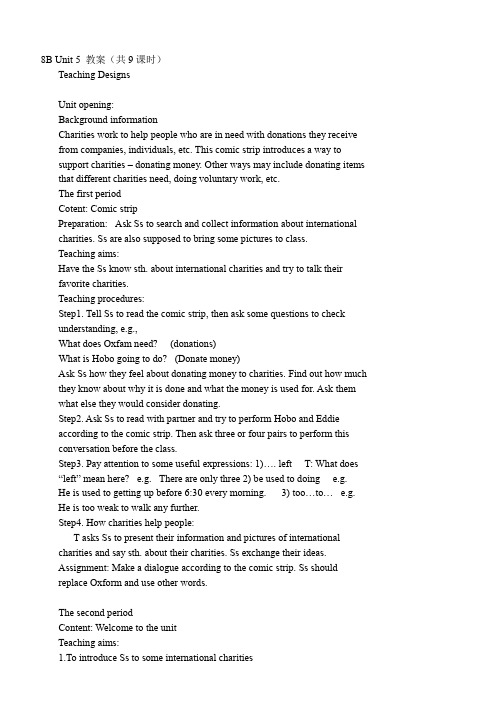
8B Unit 5 教案(共9课时)Teaching DesignsUnit opening:Background informationCharities work to help people who are in need with donations they receive from companies, individuals, etc. This comic strip introduces a way tosupport charities – donating money. Other ways may include donating items that different charities need, doing voluntary work, etc.The first periodCotent: Comic stripPreparation: Ask Ss to search and collect information about international charities. Ss are also supposed to bring some pictures to class.Teaching aims:Have the Ss know sth. about international charities and try to talk theirfavorite charities.Teaching procedures:Step1. Tell Ss to read the comic strip, then ask some questions to checkunderstanding, e.g.,What does Oxfam need? (donations)What is Hobo going to do? (Donate money)Ask Ss how they feel about donating money to charities. Find out how much they know about why it is done and what the money is used for. Ask them what else they would consider donating.Step2. Ask Ss to read with partner and try to perform Hobo and Eddieaccording to the comic strip. Then ask three or four pairs to perform thisconversation before the class.Step3. Pay attention to some useful expressions: 1)…. left T: What does “left” mean here? e.g. There are only three 2) be used to doing e.g.He is used to getting up before 6:30 every morning. 3) too…to… e.g.He is too weak to walk any further.Step4. How charities help people:T asks Ss to present their information and pictures of international charities and say sth. about their charities. Ss exchange their ideas.Assignment: Make a dialogue according to the comic strip. Ss shouldreplace Oxform and use other words.The second periodContent: Welcome to the unitTeaching aims:1.To introduce Ss to some international charities2. To prioritize needs in poor countries.Teaching procedures:Step1. T introduces background information:There are many international charities helping needy people and worthycauses all over the world. Look at some symbols in Part A. T uses thesesymbols to present the following charities. T puts the pictures withthese symbols on the blackboard.Step2. Talk about international charities and the work they do. Ask SsWhich international charities they know and write a list on the board.Step3. Tell Ss To look at the symbols in Part A and the names of thecharities in the box. Ask them to write the names of the charities underthe pictures. Tell them to try to do the task on their own first, thencompare answers with a partner.Step4. Check answers as a class. Then Ss How much they know about what the charities in Part A do and how they help people.Step5. Talk about what life is like for people who are very poor. Ask Sstothink about how their lives might be different if they had almost nomoney.Step6. Divide the class into pairs. Ask Ss to look at the list of items inPart B and decide which items are the most important and which items arethe least important for people in poor countries.Assignment:Be able to know more international charities and try to remember theirfull names.The third periodTeaching aims: 1. Understand open questions used in an interview.2. Infer general meaning from title and context.3. Predict the meanings of specific words from close context4. Check understanding by linking parts of sentences.5. Summarize information by completing notes.Teaching procedures:Part A:Step1 Ask if Ss. Know anyone who works for a charity, and if so, whichcharity and what they do.Step2 T writes “ORBIS” on the bl ackboard. Ask Ss what they know about ORBIS or whether they have heard of it before doing the Welcome to theunit exercise. Talk about blindness and how it might affect a person’slife.Step 3 Listen to the tape about the reading, and then ask Ss to read thetext by themselves again.Step 4 Ask Ss some questions to check their understanding and encourage sts. to think more about the topic.Step 5 Ask Ss to do pair work. They practice the interview and perform Dr Ma and the interviewer. ( Three or four pairs perform the interview.)Step 6 Ask Ss to find out the language points in the conversation and analyze them.Part B:Step 1 Remind Ss that the vocabulary listed in Part B1 appears in the interview on pages 76 and 77. If Ss are not sure what a word means, it may help them to read the word in context on those pages.Step 2 Tell Ss to work on their own to complete Part B1.Step 3 Ask five Ss to each read out one word and its definition. Tell Ssto check their own answers.Step 4 Tell Ss to read the interview on pages 76 and 77 again, and usethe information there to help them complete Part B2.Step 5 Tasks one s tudent to read out Amy’s article, pausing at the blanks. This student asks the other Ss for the correct words to complete sentences.Part C:Step1. Explain the context of Part C1. Amy is looking at the ORBIS website and making notes.Step2. Sts. read Amy’s notes and match the first halves of the sentenceson the left with the second halves on the right by putting the correctletters in blanks.Step3. Check answers as a class. Ask six Ss to read out one complete sentence each. Write the correct sequence of letters on the board so Sscan check their answers.Step4. Ask Ss to read Daniel’s notes in Part C2 through first for overall meaning before they do the exercise.S tep5. Ask Ss to complete Daniel’s notes by selecting the correct words from the words in brackets.Step6. When Sts. have finished PartC2, ask volunteers to read out one sentence each.Assignment: Finish the exercises about Reading in workbooks.The fourth periodContents: V ocabularyTeaching aims:1 To develop an understanding of suffixes2 To use appropriate verbs and adjectives in context3 To use suffixes to create nounsImportant and difficult points:We can add –ion(-ation) and –ment to create nounsTeaching proceduresStep1 Revision1 Review the useful expressions英汉互译:1.习惯每天早起 e the plane as a teaching center2.为许多贫困的病人做手术7.some information about international charities3.创办一所希望小学8.affect about 45 million people around theworld4.百分之八十的失明的病例9.support our work by sending donations to ORBIS5.作关于国际儿童基金会的报告10.raise money by organizing other funding-raisingactivities2 Retell the readingStep2 presentation1. Suffixes & prefixesNounadjectiveAdj.oppositecare-ful(less)possibleIm-Help-ful(less)happyUn-use-ful(less)honestdis-e.g. 1. The boy is very help_______ but care________.2. The boy is quite __________(honest) so his father is very_________.(happy)2.e.g. 1.The boy was late because he was ________.(ill)because of his ___________.2.We often ___________ on TV and this is our __________. (advertise)Step3 V ocabulary1.We can form nouns by adding ‘ment’, ‘-ness’, ‘-ion’ to other wordsV erb& adjective + Suffixes ‘-ment’, ‘-ness’, ‘-ion’ → Nounmove + ment → movementill nessillnessprevent ion preventionorganize ation organization2. Finish the exercises.Step 4 more practice用所给的单词填空。
- 1、下载文档前请自行甄别文档内容的完整性,平台不提供额外的编辑、内容补充、找答案等附加服务。
- 2、"仅部分预览"的文档,不可在线预览部分如存在完整性等问题,可反馈申请退款(可完整预览的文档不适用该条件!)。
- 3、如文档侵犯您的权益,请联系客服反馈,我们会尽快为您处理(人工客服工作时间:9:00-18:30)。
主备人:王茹年月日Content:Revision
Period:10-7
Teaching aims and demands:
Knowledge aims :To grasp the important words and phrases
To Finish off the writing
Key points:
Useful words and expressions in the unit
Difficult points:
1.How to write a passage about a child who was helped byUNICEF
2.To know a lot about the international charities
3.such...that/ so…that
ed to/ be used to
Teaching methods: Listening, speaking and writing
Teaching procedures:
达标检测(unit5)
一、单项选择
1.He can ________ in the hospital.
A.cured
B. be cured
C. cure
D.curing
2.People will support our work by ________ donations to ORBIS.
A.send
B.sending
C.being sent
D.sent
3.They are ______ poor _________they can’t go to see a doctor.
A.too;to
B.either;or
C.so;that
D.such;that
4.I am proud ________ I can do something for the poor.
A. of
B.that
C.on
D.it
5.Lucy said she hadn’t heard ___________ music before.
A.such beautiful
B.a beautiful
C.so beautiful
D.quite beautiful
6.UNICEF is an _________ that works for children.
A.newpaper
B.school
C. shopping mall
anization
7.The children should also __________ kindness.
A.treat with
B.treated with
C. be treated with
D.be treat with
8.She left in __________ a hurry _________ she forget to lock the door.
A.so;and
B.such; that
C. too;to
D. such; and
二、用词的适当形式填空
1.We made a __________(decide) at the meeting last night.
2.People are used to ___________(eat) hot food in winter.
3.Sorry, I __________(leave) my homework at home.
4.The Red Cross _________(start) in 1863.
5.He performs over 200 ________(operate) on blind people.
6.My brother studies in a _________(medicine) school for five years.
7.They have good ___________(educate) in that college.
8.The rise in the price of goods __________(affect) us all.
三、句型转换
1.He got up so late that he couldn’t catch the early bus.(同义句)
_______________________________________________________________.
2.It takesORBIS a long time to fly from one country to another.( 同义句) _______________________________________________________________.
3.WWF thinks protecting wildlife is very important.( 同义句)
_______________________________________________________________.
4.The Green family used to watch TV in the evening.(提问)
________________________________________________________________?
5.70%的学生对流行音乐感兴趣.
_______________________________________________________________.
四、书面表达
请你根据所掌握的有关ORBIS信息,写一篇介绍ORBIS的短文.
_______________________________________________________________________
________________________________________________________________________。
